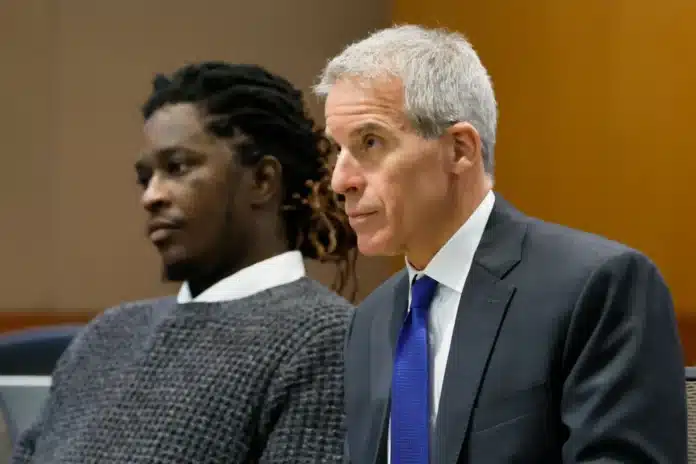YSL Case Explained: Inside the High-Profile Trial
YSL Case Explained: Young Thug’s Legal Battle and Release

The YSL (Young Slime Life) case has been a focal point in the music and legal communities, intertwining the realms of hip-hop culture and criminal justice.
Central to this case is rapper Young Thug, whose real name is Jeffery Lamar Williams, and his association with YSL, a collective he co-founded. The case has raised significant discussions about the use of artistic expression in legal proceedings and the broader implications for the music industry.
Background of the YSL Case
In May 2022, Young Thug, along with 27 others, was indicted under Georgia’s Racketeer Influenced and Corrupt Organizations (RICO) Act. The indictment alleged that YSL functioned as a criminal street gang involved in various illegal activities, including murder, armed robbery, and drug trafficking. Prosecutors contended that Young Thug played a leadership role within this organization. (HipHopDX)
Legal Proceedings and Developments
The trial commenced in November 2023, marking the beginning of what would become Georgia’s longest criminal trial. The prosecution presented evidence, including song lyrics and social media posts, to establish YSL’s alleged criminal activities. This approach sparked debates about the admissibility of artistic content as evidence in criminal cases. (The Fader)
Throughout the trial, several co-defendants accepted plea deals, resulting in reduced sentences. For instance, in October 2024, defendants like Marquavius Huey and Rodalius Ryan entered guilty pleas, leading to lesser charges and sentences. (Rolling Stone MENA)
Young Thug’s Plea Deal and Release
On October 31, 2024, Young Thug entered a plea deal, pleading guilty to multiple charges, including drug and gun offenses, as well as gang-related activities. He also entered a no-contest plea to racketeering conspiracy and leading a criminal street gang. As part of the agreement, he was sentenced to time served and 15 years of probation. This plea deal led to his release after more than two years in custody.(Page Six)
The terms of his probation include performing 100 hours of community service annually and restrictions on returning to the Atlanta metropolitan area, except for specific events. Additionally, he is required to conduct anti-gang and anti-gun presentations in Atlanta four times per year. (Page Six)
Implications and Reactions
Young Thug’s plea deal and subsequent release have elicited varied reactions. Supporters view it as a fair resolution, allowing the artist to resume his career and contribute positively to the community. Critics, however, argue that the case sets a concerning precedent regarding the use of artistic expression in legal contexts. The trial’s reliance on song lyrics and social media content as evidence has intensified discussions about freedom of speech and the potential criminalization of art. (Vulture)
Conclusion
The YSL case underscores the complex intersection between art and law. Young Thug’s plea deal and release highlight the challenges in distinguishing between artistic persona and real-life actions within the legal system. As the music industry and legal professionals reflect on this case, it serves as a pivotal example of the ongoing debate over the boundaries of artistic expression and its implications in criminal justice.









































